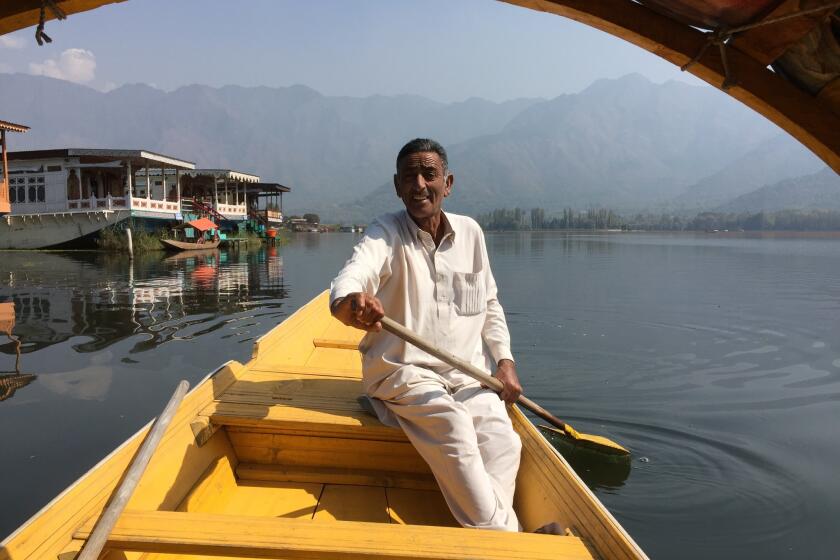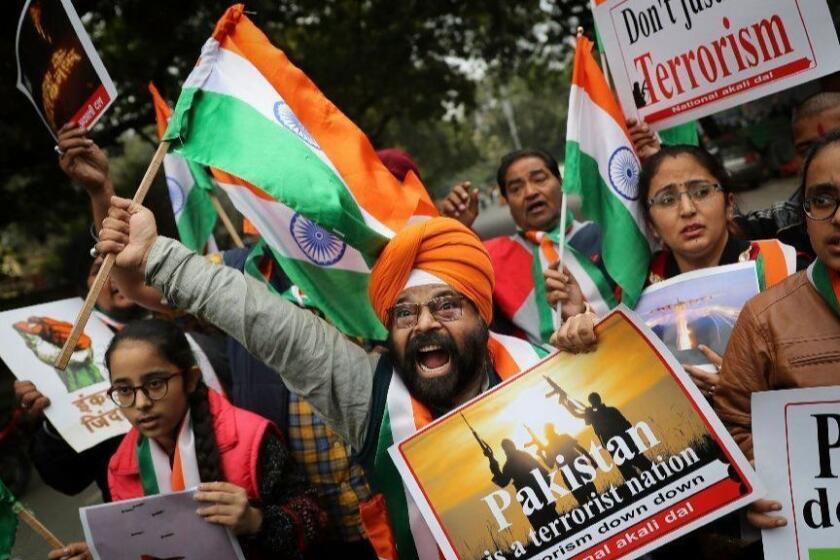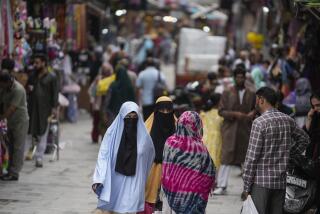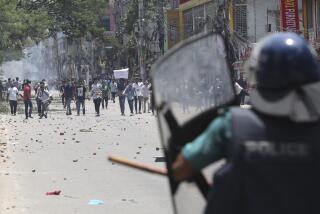Fear and tension mount in Kashmir’s largest city amid lockdown
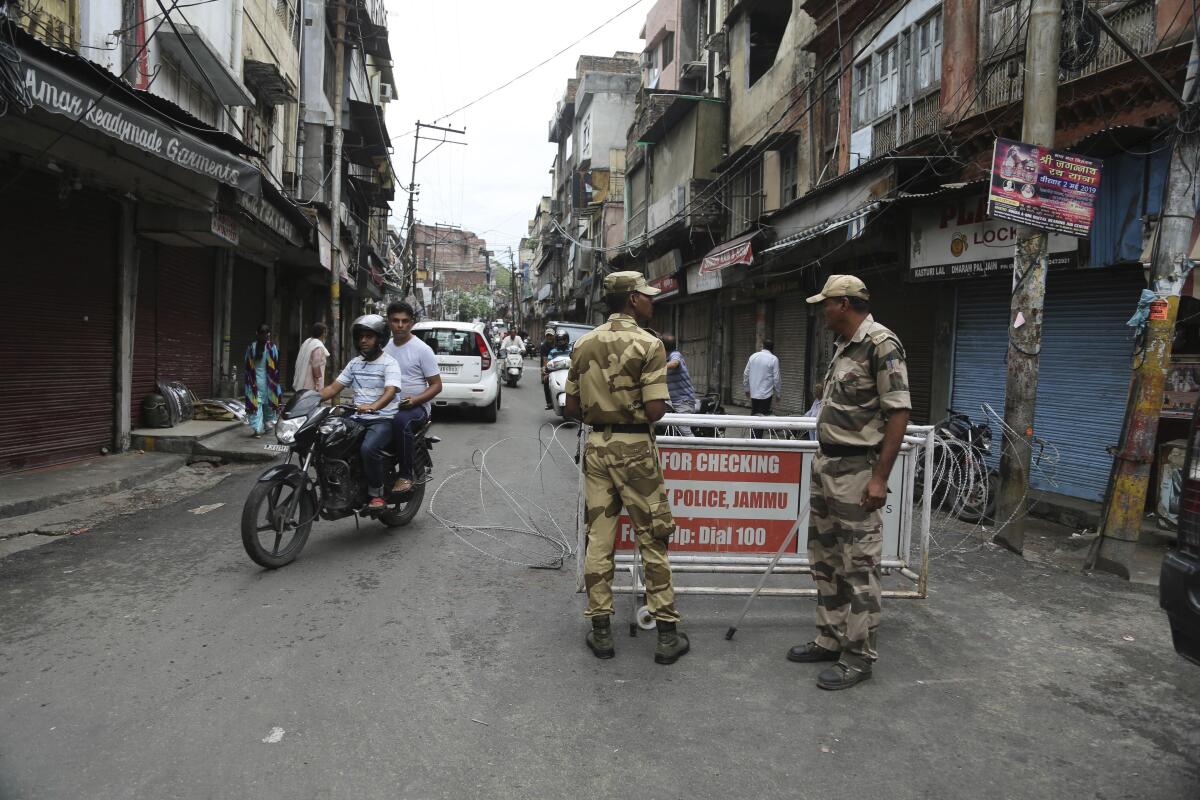
- Share via
SRINAGAR, India — The boulevard along Dal Lake ordinarily brims with tourists, who come to bask in the commanding views of the snowcapped Zabarwan mountains.
But for the last four days, the thoroughfare has been mostly empty and silent. Tourists in this city of sprawling gardens and colorful houseboats have fled — leaving behind more than a million residents, many hunkered in their homes and seized with fear.
Srinagar is the summer capital of what was the semi-autonomous Indian state of Jammu and Kashmir. Then on Monday, the Indian government revoked the Muslim-majority state’s decades-old special status and constitution in a reorganization that’s enraged local residents and neighboring Pakistan.
Jammu and Kashmir is on the Indian side of the larger disputed Kashmir region, a mountainous territory that clips together the northern reaches of India and Pakistan, two bitter nuclear rivals.
The constitutional change downgrades Jammu and Kashmir’s statehood to a territory administered by New Delhi. It also fulfills a promise by Indian Prime Minister Narendra Modi’s Hindu nationalist party to rein in a region that’s been the site of decades of violence and opposition to Indian rule.
Bashir Ahmad slid his oar into the gray-green water, making a gentle splash.
Pakistan responded to the move Wednesday by downgrading diplomatic ties with India and suspending bilateral trade. That drew a rebuke from New Delhi, which accused Islamabad of meddling with India’s internal affairs.
In a speech Thursday night, Modi said the changes were intended to “free Jammu and Kashmir of terrorism and separatism.” He referred to it as the “mainstreaming” of the Kashmiri population with the rest of the nation and promised that the situation would “return to normal gradually.” He also, however, took a jab at Pakistan, saying it had used the constitutional status of Jammu and Kashmir “as a weapon ... to incite anti-national feelings against some people in our country.”
Caught in the middle of the dispute are the 5.5 million inhabitants of Jammu and Kashmir, including residents of Srinagar who described a city in total lockdown.
A phone and internet blackout rendered mobile devices and land lines inoperable. A 24-hour curfew left streets barren. Checkpoints manned by armed soldiers were set up at seemingly every intersection. Residents pleading to get through to buy food or reach hospitals were often cursed at and met with threats of beatings by troops.
“We have been in panic mode,” said Huzaif Ahmed, a university student who rushed back to Srinagar after the blackout was introduced. The curfew, however, left him stranded at Sheikh ul-Alam International Airport, which was inundated with tourists and Indian migrant workers looking to leave.
Nighttime clashes between residents throwing stones and soldiers shooting pellets have been reported. A 17-year-old boy drowned in a river Monday trying to escape police, according to HuffPost India.
News has been sparse. Local media have been blacked out. Only government officials equipped with satellite phones have been given access to outside communication. (This article was transmitted from New Delhi because of the internet blackout in Kashmir.)
In interviews, soldiers inside the city said it was their first deployment to Kashmir. They brought with them armored vehicles, which prowled Srinagar reminding residents over loudspeakers of the curfew.
As the international community called for calm, India and Pakistan appeared to be bracing for more tension. Hundreds of Kashmiris have reportedly been detained by authorities in recent days.
When 35-year-old Indian fighter pilot Abhinandan Varthaman, wearing a sport coat and rakish gunslinger mustache, walked across the heavily armed Pakistani border into India on Friday, it calmed nerves across the subcontinent and beyond.
Kashmir is India’s only Muslim-majority state and the lifting of its special status, known as Article 370, means the loss of constitutional protections such as a prohibition on outsiders buying land or receiving government jobs. That could pave the way for Hindu settlers to challenge Kashmir’s Muslim population.
India and Pakistan have fought two wars over the region and tensions were again inflamed this year after 40 Indian paramilitary troops were killed in a suicide bombing there in February. That was followed by the first Indian airstrikes on Pakistan in nearly 50 years.
Amid the worsening climate, Abid Khan, a businessman in Srinagar, said New Delhi’s decision to revoke statehood will only embolden residents to resist India’s control.
“They can never suppress our voices,” he said. “Even if they keep us under curfew for months, we will still fight.”
India is saying “it’s a new morning,” he added, “but they must know after this there will only be darkness.”
Special correspondent Khan reported from Srinagar and Times staff writer Pierson from Singapore.
More to Read
Sign up for Essential California
The most important California stories and recommendations in your inbox every morning.
You may occasionally receive promotional content from the Los Angeles Times.
